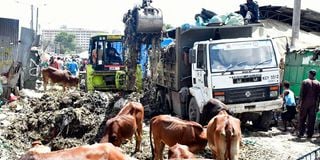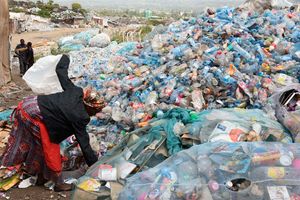
A backhoe loader empties garbage onto a truck at Muthurwa Market in Nairobi on June 10, 2023.
Garbage cartels will soon be forced out of the lucrative business once Nairobi City County establishes an independent authority dedicated solely to waste management.
Governor Johnson Sakaja told the Senate Committee on Finance and Budget that he was in the process of setting up the Nairobi County Solid Waste Management Authority.
Mr Sakaja said the county had already received 24 trucks and was expecting another 200 as the county moves to take control of waste collection from private operators.
"There are a lot of vested interests in waste management in Nairobi. There is a lot of sabotage and corruption. I am in the process of setting up an independent authority that will deal exclusively with waste management," said Mr Sakaja.
"Waste management is about money and business. The amount of money paid to private waste collectors is not sustainable. We are now investing in our own equipment and machinery. We will soon get the Nairobi County Waste Management Authority to manage waste and do away with private garbage collectors.
Data from the Economic Survey 2024 shows that Nairobi City County generated 1,191,500 tonnes of garbage in 2023 compared to 1,095,000 tonnes in 2022.
The survey shows that of the garbage generated, 1,025,200 tonnes were collected in 2023 compared to 813,500 tonnes in 2022.
Solid waste
In 2022, Nairobi City County generated an average of 3,000 tonnes of solid waste per day, of which 2,200 tonnes were collected, meaning that 26 per cent of waste is not collected daily.
A World Bank report shows that 20 per cent of waste generated in Nairobi is in the form of plastic and only 45 per cent of waste is recycled, reused or transformed for economic benefit.
The main sources of solid waste in Nairobi City County are households (54.2 per cent), followed by markets (16.7 per cent) and institutions (15.0 per cent).
The main methods of solid waste disposal in Nairobi City County are landfilling (66.7 per cent), composting (16.7 per cent) and incineration (8.3 per cent).
According to Daniel Opondo, a restaurant manager in Nairobi CBD, a hotel business is charged Sh27,000 annually for a garbage disposal licence.
The hotel also pays Sh9,000 per month for garbage collection, which is done by a company contracted by the building that houses the restaurant.
Sewerage systems
Nairobi City County has only one official gazetted dumpsite, the Dandora dumpsite, and any other place where garbage is dumped is considered illegal.
Mr Sakaja told lawmakers that the yet-to-be-established authority will be an independent body modelled on the Nairobi Water and Sewerage Company (NWSC), which independently manages the city's water and sewerage systems.
He said the idea of an independent authority was borrowed from Lagos and South Africa, which have separate solid waste management bodies.
The governor told the lawmakers that the county government had signed an agreement with China National Electric Engineering Corporation to set up a 45-megawatt waste-to-energy plant.
The Sh50 billion contract aims to recycle at least 2,500 tonnes of municipal waste per day.
Mr Sakaja told the committee, chaired by Mandera Senator Ali Roba, that the county was in the process of procuring 24 new tippers to help Nairobi City Hall manage its own waste.
He said another fleet of 200 refuse collection trucks is expected to be received by the county government.
"In the meantime, we are securing our own fleet, fuel and spare parts while we await the arrival of new tippers," Mr Sakaja said in response to a question from Nairobi Senator Edwin Sifuna.
Mr Sifuna had demanded to know the reasons behind the county's failure to collect garbage despite payment of pending bills owed to private garbage collectors.
"There is garbage everywhere but you have contracted companies to collect it. What is the problem? Is it corruption or sabotage?" Mr Sifuna asked.
The governor told the committee that the county had hired 3,500 youths, commonly known as the Green Army, to help clean the city, collect garbage and unclog drainage.
Mr Sakaja sensationally claimed that MPs and senators were pressuring him and his officials to hire certain waste collection companies and law firms.
"Politicians including MPs and Senators have been pushing for certain businesses including law firms to be paid," Mr Sakaja said, challenging committee deputy chairperson Tabitha Mutinda (nominated) to declare her interest in the non-payment of garbage collection bills.
"I challenge you to declare your interest. You have been pushing for payments for a certain company. You even introduced me to those people so that I could pay them."
Ms Mutinda did not declare her interest after claiming that garbage was piling up in city estates due to non-payment of contractors by the county government.









